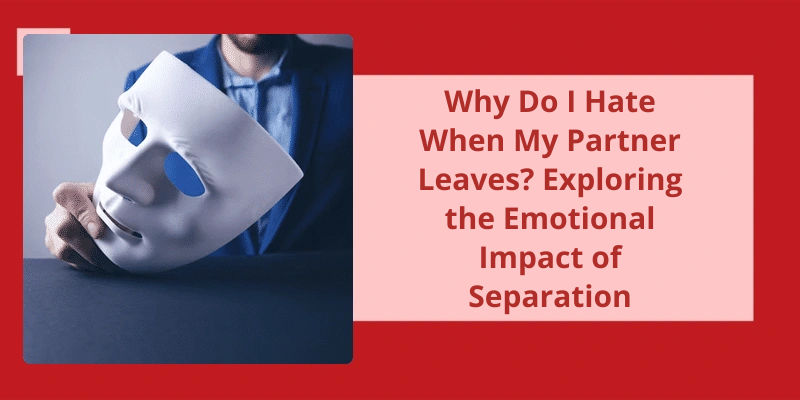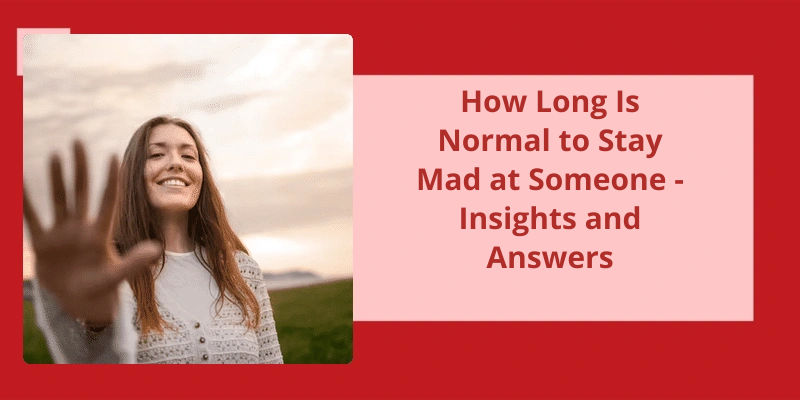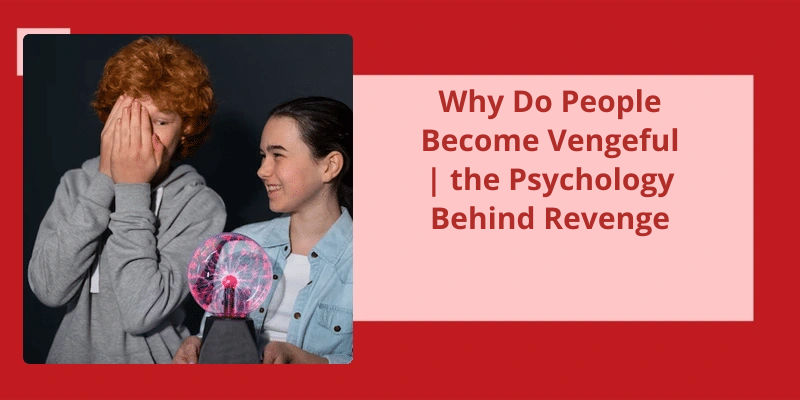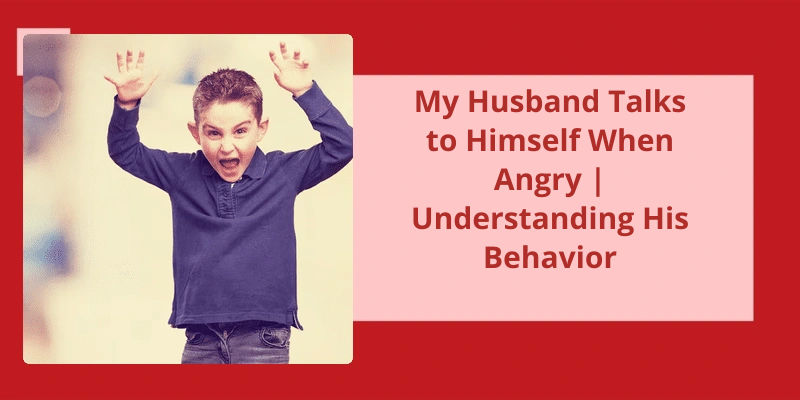As human beings, we’re wired for connection and attachment. We crave love, intimacy, and companionship, which is why we seek out romantic relationships in the first place. When we finally find that special someone who we connect with on a deep and meaningful level, we become attached to them in ways we never thought possible. However, as much as we love being with our partners and spending time with them, we can't be with them all the time. Life gets in the way, work beckons, and responsibilities pile up. When our partner leaves, even if it's just for a little while, it can trigger a host of emotions within us, including sadness, loneliness, and even anger. In this article, we explore why we hate when our partner leaves, and what we can do about it.
Why Don’t I Like Being Away From My Partner?
Separation anxiety is a common issue for many couples that have been together for a long time. It arises from the fear of losing your partner, and it can be very distressing. It’s normal to feel this way to some extent, but if youre experiencing extreme symptoms, it’s important to seek help. Not only does it negatively impact your life, but it can also affect your partner as well. Being aware of what triggers your separation anxiety and finding coping mechanisms to deal with it’s essential.
One reason why you may not like being away from your partner is that you may not have full trust in your relationship. It’s important to communicate with your partner and work on building trust within your relationship. By doing so, you can feel more confident and secure when you’ve to be away from each other.
Being away from your partner can also trigger feelings of loneliness and sadness. When youre in a relationship, you become used to sharing your daily life with another person. When that person isnt there, it can feel like something is missing. It’s important to understand that it’s okay to feel this way, but it’s also important to find ways to cope with it. You can focus on your hobbies, spend time with friends, or even find a new activity that you enjoy doing alone.
When youre in a relationship, you often make plans together and experience new things together. When youre apart, it can feel like youre missing out on the fun. It’s important to remember that there will be plenty of opportunities for you to experience things together in the future. By focusing on the present moment and enjoying your time alone, you can reduce your anxiety and look forward to being reunited with your partner.
Understanding attachment styles is crucial for having successful relationships. Anxious attachment, a type of insecure attachment, can lead to relationship separation anxiety. Those with an anxious attachment style tend to worry about their partner leaving and need reassurance from them to believe they’re truly loved. But why do we become so upset when our partner leaves? Let’s explore this question further.
Why Do I Get So Upset When My Partner Leaves?
Feel intense emotions when separated from your partner. This kind of attachment style is often developed in childhood, shaped by experiences with your primary caretakers. If your caregivers were inconsistent in providing love and care, you may have learned to fear abandonment and seek constant reassurance.
When you enter into a romantic relationship, that same fear can manifest itself. The fear of losing your partner can cause you to act clingy, needy, and overly emotional. These behaviors can actually push your partner away, making your fear of abandonment a self-fulfilling prophecy.
It’s important to recognize and address your anxious attachment style in order to have healthy and fulfilling relationships. Therapy can be a helpful tool in identifying and addressing the root causes of your attachment style. Learning how to communicate your needs in a healthy way and building a strong sense of self-worth can also help ease your fear of abandonment.
If left unchecked, your anxious attachment style can lead to a cycle of toxic relationships. You may find yourself repeatedly attracted to partners who’re emotionally distant or who trigger your fear of abandonment. Recognizing this pattern and breaking free from it takes time and effort, but it can lead to a more secure and fulfilling romantic future.
Feeling upset when your partner leaves may be a result of your anxious attachment style. Seeking therapy, practicing healthy communication and building self-worth can help alleviate these feelings and lead to healthier relationships in the long run. Ultimately, addressing your attachment style can help you break free from toxic relationship patterns and find a more fulfilling and secure love in the future.
How to Recognize if You Have an Anxious Attachment Style
If you’ve a tendency to feel clingy, insecure, and anxious in your romantic relationships, then you might have an anxious attachment style. This means that you may have a fear of abandonment, crave constant reassurance, and struggle with trusting others. Your need for closeness can sometimes push people away, making it difficult to maintain long-term relationships. If you notice these patterns in yourself, it may be helpful to seek counseling or therapy to work on building more secure attachments.
It’s not uncommon to feel an intense emotional connection to your partner, so when they’re no longer by your side, it can feel like there’s a void in your life. There are a variety of reasons why someone may miss their significant other, ranging from a chemical response in the brain to simply feeling a sense of comfort and companionship with their partner. So why exactly do we miss our partners so much when they leave? Read on to find out.
Why Do I Miss My Partner So Much When He Leaves?
Part of the reason missing a partner can be so intense is because it often triggers a sense of loneliness and abandonment. Our brains are wired to connect with others and form close relationships, so when were suddenly separated from someone we care about deeply, it can feel like a painful loss. Even if we know the separation is temporary, our emotions may not catch up to that rational understanding right away.
Of course, theres also the simple fact that missing someone is often a sign that you really love and care about them. When youre in a healthy, happy relationship, it’s natural to want to be around your partner as much as possible. Being apart can make you realize just how important they’re to you and how much you value their presence in your life. It’s okay to feel sad or upset when your partner leaves; in fact, it’s a sign that your relationship is meaningful and worth fighting for.
Source: Do any of you miss your SO after being apart for a …
It’s important to understand that anxiety can affect anyone – even in situations that may seem trivial to others. For some individuals, the departure of a loved one can cause feelings of fear and unease. This is a natural response that’s rooted in our biology, designed to keep us safe from harm. While mild anxiety is certainly manageable, it’s important to be aware of when it might become too much to handle.
Why Do I Get So Much Anxiety When My Boyfriend Leaves?
However, when this response becomes chronic or overwhelming, it can cause distress and impair daily functioning. Fear of separation can stem from a variety of factors such as insecure attachment patterns, childhood experiences of abandonment, past trauma, or simply an overactive imagination. Understanding the root cause of separation anxiety can help alleviate it’s severity.
One common cause is a fear of abandonment, which can be traced back to early childhood experiences. If a child doesn’t receive consistent love and attention from their primary caregiver, they may develop a deep-seated fear that others will leave them. This fear can become so ingrained that even as an adult, leaving time can trigger intense anxiety and feelings of abandonment.
Another cause is trauma, especially when someone has experienced abandonment or loss in the past. PTSD, or post-traumatic stress disorder, can cause feelings of anxiety and fear when someone leaves because it triggers memories of past traumatic events. Trauma therapy can help address these underlying issues and alleviate the severity of separation anxiety.
Separation anxiety can also be a symptom of attachment issues. People with insecure attachment patterns may fear leaving their partner because they’re afraid they’ll not be able to form meaningful relationships in the future. This fear can also be driven by low self-esteem and a lack of confidence in ones ability to maintain healthy relationships.
People who’re prone to anxiety may spin worst-case scenarios in their head when their partner is away, causing them to feel anxious and distressed. This type of anxiety can be addressed through cognitive-behavioral therapy, which helps people challenge and reframe negative thought patterns.
Overall, separation anxiety can be a normal response to leaving someone you care about.
Conclusion
In conclusion, the feeling of discomfort, sadness, and frustration when a partner leaves is a significant emotion that individuals experience in romantic relationships. The reasons behind this emotion are complex and dependent on individual experiences, personality traits, and attachment styles. However, research has shown that fear of abandonment, feelings of loneliness, uncertainty about the future of the relationship, and the sudden shift in routine contribute to this discomfort. It’s important to recognize, validate, and communicate these emotions with one's partner to prevent misunderstandings and conflict. Additionally, seeking therapy or counseling can help individuals overcome these emotions and develop healthy coping mechanisms to manage the pain of separation. Ultimately, the ability to navigate these emotions and communicate with one's partner with empathy and understanding is vital for the overall health and success of a relationship.






